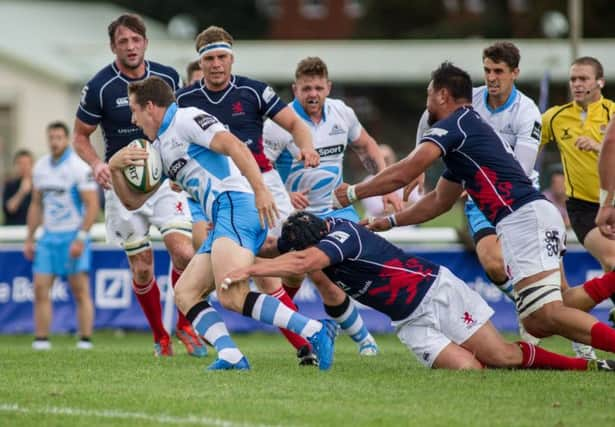Iain Morrison: SRU should fund London Scottish


London Scottish has always been an anachronism in Scottish rugby. Scottish to their southern hosts but obviously English to anyone north of the Border, they can be forgiven for not knowing which way is up.
In the old amateur days, the club boasted as many as 12 teams on a Saturday afternoon with all comers welcome but the first XV had to be properly qualified to play for Scotland and one unfortunate full-back was shown the door when he failed to unearth the requisite Gretna granny.
Advertisement
Hide AdAdvertisement
Hide AdScottish are now in the Greene King IPA Championship, one rung off the top of England’s ladder, and they got there largely thanks to the generosity of their main share-holders and sponsors such as Sir David Reid and Deutsche Bank. After fighting off the administrators and ending up at the bottom of the English leagues, it has cost the club’s supporters approximately £4.5 million to get London Scottish back to where they are today and it costs them around £500,000 per season to keep them there.
Most backers have the greater good of Scottish rugby in mind when putting their hands in their pockets to help the Exiles but, from that perspective, the return on their investment has been modest. Aside from a smattering of age-grade players – Tommy Spink led the U20s last season before signing for Glasgow – the only international representatives from London Scottish are Jamie Stevenson, who sat on the A-team bench against the Saxons last year, and Jim Thompson, who played for Scotland sevens while based in London. Club skipper Mark Bright and winger Matt Williams have both represented England at sevens.
The problem is that the London Jocks’ other main source of funding is the Rugby Football Union (RFU), who pay Championship clubs £370,000 per annum provided they field an average of 16 English-qualified players in their match-day squad in any given month. So the club’s backers/sponsors have poured several millions into a club that is largely staffed by English players because the financial reality on the ground dictates as much.
The solution is obvious. Presuming the Scottish Rugby Union (SRU) can afford to replace the RFU money – and I am not advocating ballooning the debt to pay for this – then London Scottish could revert to being what it was always supposed to be, a rugby club for Scots living in London. The vast majority of players could be Scottish because there are legions of young professionals at Edinburgh and Glasgow with almost no hope of getting game time for the pro-teams, not to mention some very handy players elsewhere.
London Scottish could become another pro-team in which the best young Scots could be tried and tested for a fraction of the £8.5m it costs to run Edinburgh (or Glasgow). By replacing the RFU’s money with their own the SRU gets a fully professional team at the top of the English Championship for an annual investment of less than £500,000 –the club was sitting first in the Championship ahead of yesterday’s match against Bedford.
It’s a steal. It is the sale of the century. It’s going for a song when you consider how much the current pro-teams cost and how much a new start-up venture would set someone back. It’s a gimmie, a gift-wrapped present, an absolute no-brainer even after you factor into the equation that several shareholders may want to reduce or taper off their own contribution.
In the highly unlikely event that every single backer (shareholders and sponsors alike) walks away from London Scottish, the SRU still gets a third pro-team for £870,000 (£500,000 + £370,000) per annum but that scenario is simply not credible.
When the club reverts to its Scottish roots and exploits the vast wealth and opportunities in England’s South East, the very opposite may be true, with companies keen to latch on to a visible Scottish sporting success on the doorstep of the biggest and richest market in the United Kingdom. There is work to be done. The club urgently needs to grow the match-day crowd, but it represents a rare opportunity.
Advertisement
Hide AdAdvertisement
Hide AdThe initial aim should be to stay in the Championship because there is a sea change in the standard and, more importantly, the costs, of stepping up to Aviva Premiership rugby but that, too, could change if the SRU or any other backer had the ambition and the spondulicks to have a crack at the big time.
There is even an outside chance of having a Pro12 franchise in London, although the RFU could kibosh that one and probably will. There are plans, by the way, to redevelop the ageing RAA.
There are hurdles to overcome, and how the Twickenham bosses would feel about SRU involvement in a club almost literally in their backyard is anyone’s guess?
The share structure of London Scottish is complex and the Scottish domestic clubs may cry foul at the governing body favouring one club over the rest, although no one can now claim that the best Scottish domestic clubs are on a level footing with Championship teams. Last season in the British and Irish Cup, Edinburgh Accies fielded a pack, seven of whom were plucked from Edinburgh Rugby’s ranks, and still got sand kicked in their face by the Exiles.
London Scottish could be Scotland’s other pro-team, at a snip. Young Scottish qualified players, especially tight-five forwards, would benefit from a season or two of hothousing in the rough and tumble of England’s excellent second division, which actually boasts two Premiership-quality squads in Worcester and Bristol.
If you believe Scottish rugby needs a third pro-team there is only one viable option, and it is in London.